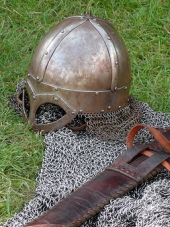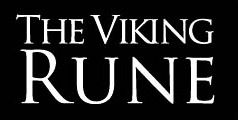 The results of the study led by Professor Mark Jobling of Leicester University, Professor Stephen Harding and Professor Judith Jesch of Nottingham University, published in Molecular Biology and Evolution in February 2008, show that up to 50% of the blood of men in Wirral in Merseyside and West Lancashire is specifically linked to Scandinavian ancestry. This is about the same as modern Orkney, well known for its Viking links. From generation to generation, DNA of the male Y-chromosome is passed along the paternal ancestry; the team of researchers took advantage of the fact that surnames are also passed along the same lines. The method proved to be especially powerful being applied not to individuals but whole populations.
The results of the study led by Professor Mark Jobling of Leicester University, Professor Stephen Harding and Professor Judith Jesch of Nottingham University, published in Molecular Biology and Evolution in February 2008, show that up to 50% of the blood of men in Wirral in Merseyside and West Lancashire is specifically linked to Scandinavian ancestry. This is about the same as modern Orkney, well known for its Viking links. From generation to generation, DNA of the male Y-chromosome is passed along the paternal ancestry; the team of researchers took advantage of the fact that surnames are also passed along the same lines. The method proved to be especially powerful being applied not to individuals but whole populations.
Thus the group of volunteers had to be selected according to certain areas and specific surnames present in these areas at least prior to 1600. After their expulsion from Dublin in 902 AD, Vikings led by a chieftain named Ingimund landed along the north Wirral coastline between the lighthouse at Lingham (Old Norse lyng holmr), Meols (melr), West Kirby (kirkjubyr) and Thurstaston (Þórsteinns tún). They spread as far as south Chester and Mersey to populate South West Lancashire, where they met another large group of Vikings.
Place names pointing to an area of intense Viking settlement played a major role in the study: for instance, Thingwall is a name of a Viking assembly, and the only two places with such name are in the North West, one in Liverpool and one in Wirral. Other Viking place names include Irby, Skelmersdale, Aighburth, Formby, Crosby, Toxteth and Croxteth. Even Tranmere (and, accordingly, Tranmere Rovers F. C.) is a Viking name: in Old Norse Trani-melr means Heron Sandbank.
Then one had to select 100 volunteers who possessed a surname pointing to Viking links and whose male ancestors lived in the same area for as long as one could trace. To this end, the team of researchers used historical records that included tax lists dating to the time of Henry XIII, as well as a list of inhabitants who had promised to help pay for a priest in Ormskirk in 1366. The surnames included: Taylor, Forshaw, Rigby, Rimmer, Robinson, Oxton, Scarisbrick and Melling.
The gurus on Viking DNA from Leicester University have secured the funding to continue their study and see how far Norse Viking blood runs into Cumbria. More details on Wirral and West Lancashire 1100th Viking Anniversary Home Page by Professor Stephen Harding.
Photo courtesy Steve & Jemma Copley. Used under the Creative Commons Attribution-Share Alike 2.0 Generic Licence.

My last name is Swarbrick, is that close enough to Scarisbrick?
I have had dupeyrens and the nurse told me that vikings were in my blood. i was born and lived in lancashire for 44 years. I just wonder does the surname come into play.
george
Hi George i have it too. My paternal ancestors are from Brindle a small village near Preston and a viking settlement 1000 years ago
interesting i have Alpha 1
I have a condition called Dupuytren’s contracture sometimes called the “Viking disease” which affects my hands.
This, my doctor assures me, links me, genetically, to the Vikings.
And, come to think of it, I do have the occasional urge to go out raping and pillaging but so far I have been able to overcome it and go back to sleep.
“And, come to think of it, I do have the occasional urge to go out raping and pillaging …”
Everybody has to have a hobby.
To make it more clear some believe that alls settlers that came from Scandinavia were viking. Even Norsemen are called viking sometimes. Danes Anglos Saxons ect all the same people. It would not be uncommon to to Danes with Anglos and Saxons together. I mean The Norman from Normandy came from more then just Norway because we know that the amount of people that were under Rollo was not great bigger then the Frankish army. So the Local Franks Gauls ect would have joined or got theres if they did not join Rollo.
Scandinavian Did not really have names like we think they did. They might have like 10 with the same name. and they would use by or son of to identify who they wanted to speak to. People took names from many different things a Viking From Sweden that went to Denmark and like the sound of a name would simple change it. That is it no need to change his drivers licence or birth certificate.
Britain was used as a hub for Celtic ans Norse people for travel and trade. So maybe Visygoths came over with the Romans or even before to trade with the Celtics or to reup some food and mead.
How do they know these Scandinavian type names were not just adopted or were adopted even earlier?
I do have a slight problem with the whole study. Firstly R1a isn’t specific to Scandinavia, infact R1b and I1a is also found amongst Norweigans and Danes, infact 42% of Danes are R1b, so they would have brought R1b in there too. Secondly considering Britain was connected via Doggerland 6,000BC how do they know these groups didn’t get their earlier? Thirdly Tun and mere (as in Tranmere is also Old English, meaning ‘lake’) are also old English. There is evidence of Norse influence from pre-viking times and Swedish/Danish connections in Sutton Hoo and Beowulf (set entirely in Scandinavia). Norse archaeology has been found prior to the Vikings including wrist clasps from the 7th century. Infact there is new evidence of Germanic languages being spoken in Britain prior to the Anglo-Saxons including Germanic elements in Lancashire and Cumbrian Roman placenames. To rove whether any of these men are specifically Norse Viking in origin is quite impossible. Their surnames are not out of the general English surname norm. Infact three Yorkshire villages ending in -by found Anglian crosses in the churchyards and no scandinavian inscriptions showing that presuming a Viking origin considering the lack of evidence of placenames in the north and east of England, can be misleading. There is even some who believe their was a scandi form of Old English was spoken in the north hence words such as they which are difficult to change as they are pronouns.
Norway, Denmark and Sweden ARE Scandinavia, and Vikings originated in Norway/Sweden/Denmark.
You imply that you somehow think Norwegians and Danes AREN’T Scandinavian?!?? You should look up Scandinavia on a map, you’ll find Norway, Sweden and Denmark, basically.
‘Germanic’ culture does not mean from Germany, necessarily. It also includes the North/Scandinavia.
Also many English words came from Norse language, a lot of which we still use today, by studying the etymology one can find the origin of the words.
‘Norse Archaeology has been found prior to the Vikings’- I assume you mean prior the the Viking invasion age? Because, of course, Norse are Vikings, and the majority of Viking invasions into Britain and Ireland came from Norway. The archaeology and culture didn’t suddenly change during the ‘Viking age’ either, and there had been trade between the islands for many years before the looting.
beck is an old norse name i wud luv 2 knw whr we fit in old norse
Beck is Brook or steam
Bick means Becon like a look out.
Byk mean cow or monster beast.
hello there,
I was wondering where i would find out if i was related to the Vikings. I orignally come from Sheffield in South Yorkshire England. Would I need to take a DNA test? And I wondered if the name Oscaby is a Norweigan.
I look forward to hearing from you
Kind regards
Hi,
My name “Ellal” comes from “Ellel,” a small town in Lancashire–and derived from “Elhale,” an Anglo-Saxon name. Probably Angle as I don’t think the Saxons settled Lancashire. But how can one determine if he has Viking blood–or Angle blood (from southern Denmark–proto-Vikings)?
A name is just something Scandinavian took after they took over a area. So Names changed a lot the only way to test yourself is y-dna Test.
Name sounds Scandinavian both ways it might be derived from Ellen Alen or Alan You should check out how people say the name in Saxon German and Anglo Denmark to see if it is like yours.
Sax Knife in Saxon and it was changed to the old Norse way Knife from Knifr so you name is derived from Norse with both Anglo-Saxon spelling because Elhale is close to Some Saxon words.
Hi Bob
The only way you can find out where your genes come from is to have them checked .
There are several online Y-DNA checking sites that will send you a swab kit in the mail to send back to them to be checked for you .
Some of these sites let you check only a small amount of your haplotype and also the Y-DNA panels at first and then upgrade to more information later as you wish or can afford .
The area you are referring to as southern Denmark is called The Frisian people .
The main Haplotype is R1b . as is many in the area you talk about . They have their on Haplogroups that are for them . Many people in England carrie the genes of these
people for over a thousand years . Above the Dane Line and below the Scott line many of these people carrie the R1b subclade U106/S21 and mutations U106 and L48 it is in haplogroup . Your testing Co. can tell if you fit into these groups or what ever other group you might fit in .
Something the testing co. cannot tell you is if you are a Viking .
A Viking is what the Monks called the Viks which is what we now call a fjord in Norway because they did not now what else to call them . You can call your self a Viking if any of your genes come from Norway , Sweden , Denmark or below the area that is just below the Netherlands and the Baltic Sea area if it make you happy .
Good Luck Brian